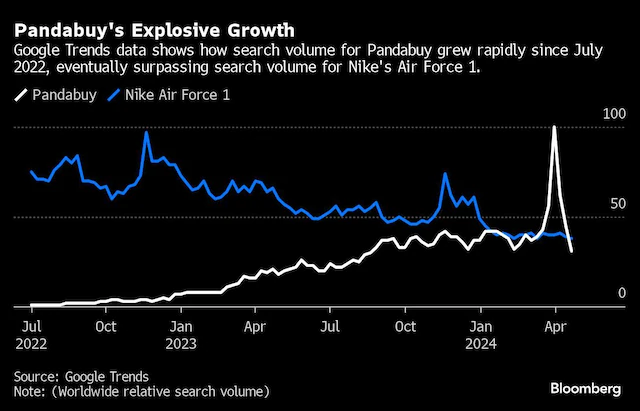A shipment of luxury goods appeared at his doorstep just in time for the festive season, and King, eager to share his haul, took to TikTok to showcase the items.
The video, which has since amassed nearly 2 million views, documented King unboxing what appeared to be a bounty of high-end fashion and accessories.
King’s haul included:
- £2,000 ($2,488 USD) worth of Nike shoes
- A £2,500 Goyard messenger bag
- A rare £600 Dior T-shirt
- A retro Manchester City FC jersey
- Palm Angels sweatpants
- An £875 Kaws Companion figurine
However, these goods came from Pandabuy, a Chinese e-commerce platform that has built a reputation for offering “designer” fashions at a fraction of the cost, despite their dubious origins.
In his video, King acknowledged the counterfeit nature of the goods, pointing out that the Palm Angels sweatpants “didn’t look too bad,” though their feel betrayed their authenticity.
This acknowledgment reflects the current trend among some online personalities, who openly share their counterfeit hauls and promote platforms like Pandabuy to their followers.
Earlier this month, Chinese authorities raided Pandabuy’s offices in Hangzhou and its associated warehouses, seizing millions of goods amid allegations of distributing counterfeit products.
This marked a rare victory for retailers who have long fought to shut down Pandabuy and other platforms offering fake branded goods.
Pandabuy’s operation is part of a broader online trade in counterfeit products.
The platform serves as a “shopping agent,” acting as a middleman between Chinese vendors and global buyers, offering services such as photography and shipping.
However, an investigation by anti-piracy firm Corsearch revealed that nearly all the branded goods on Pandabuy were replicas or outright counterfeits.
The raid on Pandabuy is part of a decades-long battle between counterfeiters and intellectual property holders, as well as law enforcement.
The UK police, in collaboration with Chinese authorities and various private-sector players, coordinated a six-month investigation into the platform’s activities. The Pandabuy Raid.
However, the complex nature of the counterfeit goods trade, along with its migration to individual packages rather than cargo containers, poses challenges for border agents and law enforcement alike.

Despite the raid, Pandabuy seems to have resumed operations, and counterfeit goods have shifted to other platforms.
On Reddit and Discord, discussions abound about alternative sources, including private Telegram groups, hinting at the persistent demand for counterfeit luxury goods.
The situation exemplifies the struggle to control the distribution of counterfeit products online.
Big retailers like Alibaba and Amazon have made strides in removing counterfeit sellers, yet the challenge remains to quell the flow of goods from platforms like Pandabuy.
The term ‘Pandabuy’ has since been banned on TikTok.


